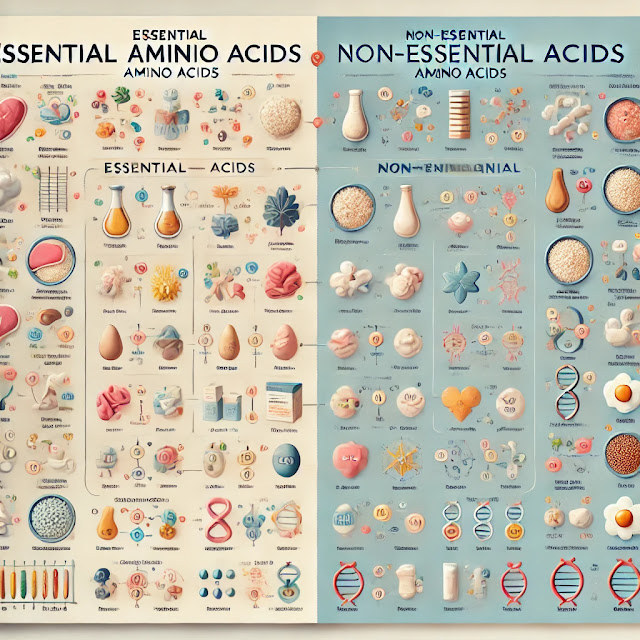Amino acids are organic compounds that serve as the building blocks for proteins, which play crucial roles in nearly all biological processes. They are classified as essential and non-essential amino acids based on the body's ability to synthesize them.
Essential Amino Acids
Essential amino acids are those that cannot be synthesized by the body and must be obtained through diet. There are nine essential amino acids for humans:
- Histidine: Important for growth and tissue repair; precursor for histamine, a neurotransmitter involved in immune responses.
- Isoleucine: Involved in muscle metabolism and immune function; used in hemoglobin synthesis and energy regulation.
- Leucine: Plays a role in protein synthesis, muscle repair, and regulation of blood sugar levels.
- Lysine: Important for protein synthesis, hormone and enzyme production, and calcium absorption.
- Methionine: A sulfur-containing amino acid essential for metabolism and detoxification, and is a precursor for other sulfur-containing compounds.
- Phenylalanine: Precursor for neurotransmitters like dopamine, norepinephrine, and epinephrine.
- Threonine: Important for protein balance in the body; used in collagen, elastin, and enamel production.
- Tryptophan: Precursor for serotonin and melatonin, affecting mood, sleep, and appetite.
- Valine: Supports muscle metabolism and tissue repair.
Pharmaceutical Importance of Essential Amino Acids:
- Medical Supplements: Essential amino acids are commonly used in dietary supplements for individuals with deficiencies or specific health needs.
- Therapeutics: They are used in treatments for muscle-wasting conditions, liver diseases, and metabolic disorders.
- Wound Healing and Recovery: Essential amino acids support wound healing and post-operative recovery.
2. Non-Essential Amino Acids
Non-essential amino acids can be synthesized by the body. Although termed "non-essential," they are still vital for various physiological functions. Key non-essential amino acids include:
- Alanine: Involved in energy production, muscle tissue repair, and immunity.
- Arginine: Important for immune function and hormone release; serves as a precursor to nitric oxide, a vasodilator.
- Asparagine: Needed for protein synthesis and neurotransmitter production.
- Aspartic Acid: Plays a role in the urea cycle and DNA synthesis.
- Cysteine: Essential for detoxification and production of antioxidants like glutathione.
- Glutamic Acid: Acts as a neurotransmitter and is involved in protein synthesis.
- Glutamine: Crucial for immune function, intestinal health, and muscle repair.
- Glycine: Participates in collagen production, CNS function, and detoxification.
- Proline: Important for collagen formation and skin, joint, and connective tissue health.
- Serine: Needed for metabolism, immune function, and muscle growth.
- Tyrosine: Precursor to dopamine, norepinephrine, and thyroid hormones.
Pharmaceutical Importance of Non-Essential Amino Acids:
- Wound Healing and Immunity: Some, like glutamine and arginine, support immune function and healing, making them useful in critical care and surgical recovery.
- Detoxification: Amino acids like cysteine are used in formulations to aid detoxification.
- Antioxidant Production: Cysteine is a precursor of glutathione, a potent antioxidant used in pharmaceutical formulations.
- Mental Health and Neurological Support: Tyrosine and glutamic acid have applications in mental health treatments due to their role in neurotransmitter synthesis.
Summary
Essential and non-essential amino acids are fundamental to health, with specific uses in pharmaceuticals for supplementation, therapeutic formulations, immune support, wound healing, and mental health. Understanding these roles helps in their targeted use in clinical and health applications.













0 Comments
Thanks for your feedback, ll get back to you soon